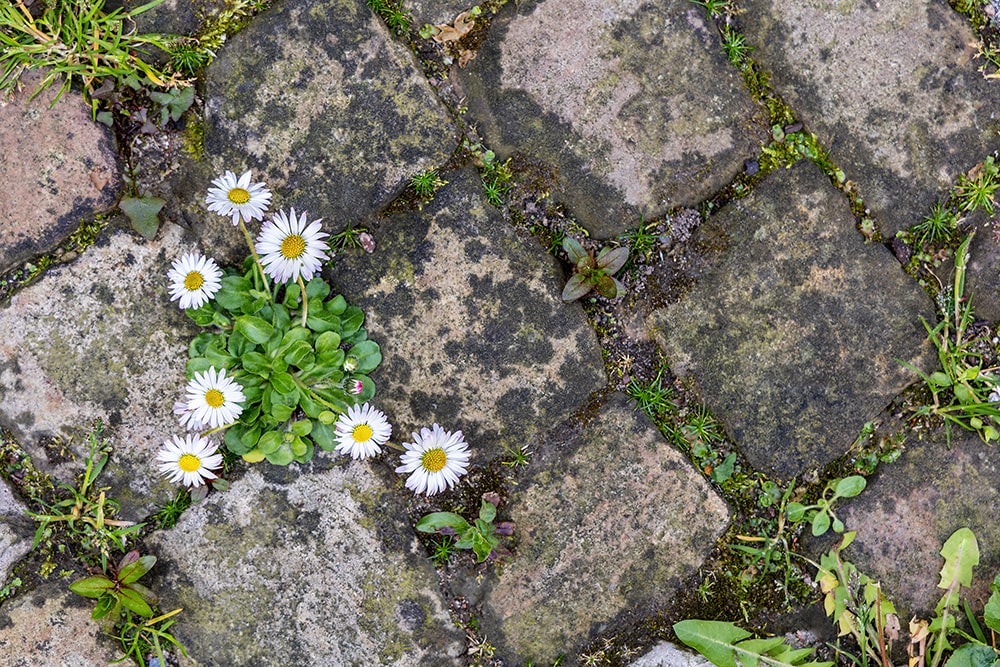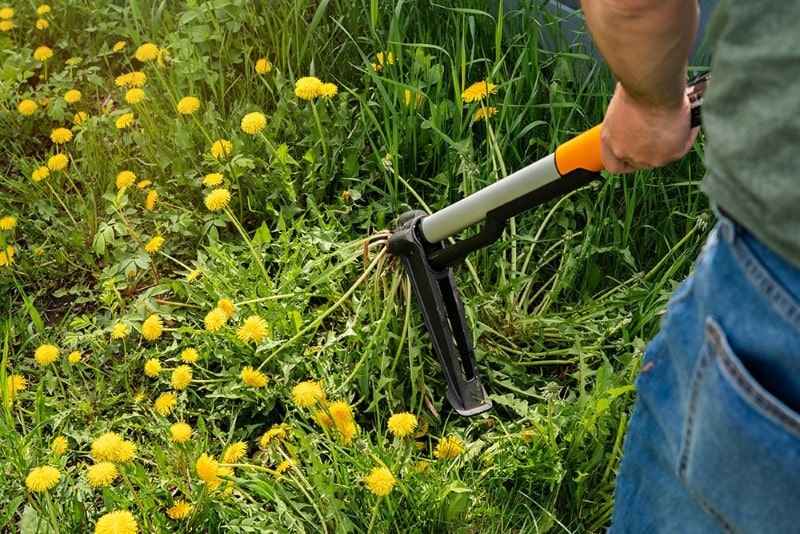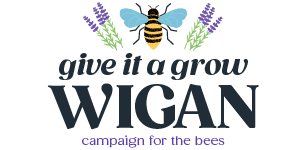Weeds’ comes up a lot in our garden work. We are advocates of using a chemical-free approach wherever possible and resorting to not weeding if we have to. Let me explain why.
Extremely heavy use of Glyphosate (and more chemicals) around the UK and worldwide has reduced the amount of wildflowers for our insects and pollinators, removing their food source and shelter. It’s also considered ‘possibly carcinogenic‘, so we’d never recommend using it. But think if it’s necessary before bothering to weed at all in the first place.
If you do feel like you need to remove some, here a few tips to make your life easier!
Consider keeping it

I’m often asked, ‘Is this a weed or a wildflower?‘ Well, a weed is usually a wildflower! I analyse plants that have popped up before automatically pulling them and ask myself (or google) a few questions.
What is it?
Does it look nice?
Is it spreading a lot?
Is it harming anything else?
Is it actually beneficial?
These questions mean that sometimes, it’s necessary to get rid (too invasive, unsafe, affecting another plant), but sometimes, it’s ok to leave it be. For example, many butterflies rely on nettles, so if you can keep them at bay a little, it will really help.
At home, chives grow a lot at mine. They look quite nice, bees love them, and they aren’t bothering anything else, so I let them be. They have spread a little, but nowhere that wasn’t just tarmacked anyway. The same can be said for herb robert, foxgloves and white valerian; they brighten up my tarmac driveway.
I also have Ivy and brambles, I keep some, but I chop them back heavily once a year at least, as they can be very invasive. They’d take over if I let them!
This view can be unpopular with many gardeners after a more immaculate-looking garden and driveway, but it’s to our detriment if we remove so many flowers. All those tiny plants add up to a lot more nectar and pollen for pollinators. Weeding thoroughly removes the food and shelter for so many pollinators, and reduces their populations. And once the insects suffer and reduce in number, it quickly goes up the ecosystem, we start to see fewer birds and small mammals and so on.
Pollination is also vital for our food! The more pollinators we have, the better the food is pollinated, giving us higher yields of fruit and veg. Studies reckon that pollination is worth €153 billion per year.
Try and reframe how you see weeds in the first place; you’ll save yourself some time and effort if you let them grow. We even wrote a blog post on weeds we love
Manually pull
There are tools you can use to help make manual weeding easier. For example, a stand-up weed puller, serrated spade, a hoe, a burner (though I’ve not tried that) or a mattock.
When weeding, try to get as much of the root as possible and don’t leave little fragments behind; otherwise, you’ll only be doing it again fairly soon. It can take a little longer to do a thorough job, but you’ll save time in the future.
Here’s a hot tip. Try waiting until weeding just after it has rained, it’s much easier than weeding hard dry soil! They’ll be easier to pull out without a fight and save you time and energy.

Don't let them go to seed
If you don’t mind a few wildflower weeds but want to reduce the spread a little, then don’t let the flower go to seed.
For example, dandelions, I don’t mind some on my lawn, but I often pull some of the flowers right at the end before it turns into a dandelion clock.
Plant more flowers and plants
Areas of bare soil will become weedy, so if you weed it, replace the wildflowers quickly. This is particularly true if it’s a large area.
Plant some things to give perennial weeds a bit of competition. It’ll look luscious, and you may need to weed less often.
Bare soil also erodes quickly into our rivers and streams, adding nutrients and negatively affecting aquatic wildlife. If you replace weeds with plants with deeper roots, they will retain more soil and moisture so that the ground stays damper and needs less watering.
If at all possible, avoid bare soil for any length of time.
Don't rotavate the soil
If you till the soil, it can look like you’ve weeded quickly and the job’s a gooden. But it can often make the problem worse. It can oxygenate the soil by weeding and bringing dormant seeds to the top.
So you may find they grow back stronger, with more of them to tackle next time. Bare soil also loses carbon more quickly and washes away.
I generally try and disturb the soil as least possible.
Add mulch
Barks chips and mulch (organic material like manure) are great friends in your garden.
Not only does a good mulch add nutrition, retain moisture and therefore keep the ground moist during hot spells. But they can help reduce weeds by blocking the sunlight to the soil.
It’s particularly recommended to add mulch in spring and in autumn if you can.
Hopefully here are a few ideas to make you pause before reaching for any sprays or pulling weeds. And some tips to make life a little easier if you do feel the need to weed!
If you would like more information on wildlife gardening, or want to keep up with more of our news, get in touch on either our Facebook page, Instagram, or email

Leave a Reply